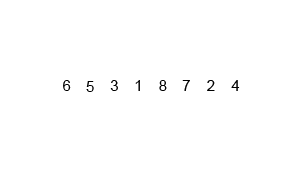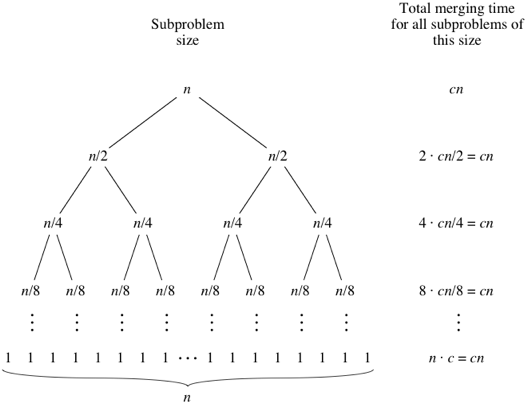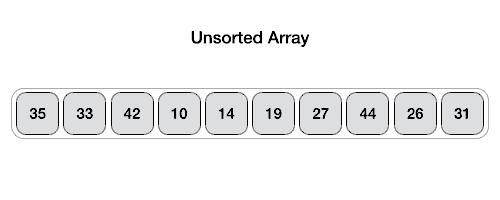--- ## Sorting overview 1. .green[Bubble sorting]: $O(n^2)$ 2. .green[Selection sorting]: $O(n^2)$ 3. .green[Heap sort]: $O(nlog(n))$ -- 1. Insertion sort -- 1. Merge sort -- 1. Quick sort --- ## Insertion sorting .footnote[Objects Abstraction Data Structures and Design Using C++, Elliot B. Koffman and Paul A.T. Wolfgang] * Inspired by Cards players. -- <img src="cards.png" width="90%" /> -- .center[<img src="insertion.png" width="50%" />] --- ### Insertion sorting: in-class demo -- ```c++ void insertionSort(std::vector<int> &data) { for (int i = 1; i < data.size(); ++i) { for (int j = i; j > 0; --j) { if (data[j] < data[j - 1]) { std::swap(data[j], data[j - 1]); } else break; } } } ``` -- #### Pull-request to add the implementation --- ## Divide and Conquer Strategy: The Merge Sorting 1. Break the big problem into smaller ones. 2. Solve the smaller problems. 3. Combine the solutions to get the solution of the big problem. --- | Merge Sort animated | |--------------------| |  | | [Creative Commons](https://en.wikipedia.org/wiki/File:Merge-sort-example-300px.gif) | --- ### Complexity Analysis | Merge Sort Analysis via diagram | |-----------------| |  | | [CC-BY-NC-SA](https://www.khanacademy.org/computing/computer-science/algorithms/merge-sort/a/analysis-of-merge-sort) | --- For advanced details, see [Analysis of merge sort \| Khan Academy](https://www.khanacademy.org/computing/computer-science/algorithms/merge-sort/a/analysis-of-merge-sort). --- ### Implementation -- #### Divide and Conquer ```c++ void mergeSort( std::vector< double > &a , int low, int high) { if (low < high) { int mid=(low+high)/2; // Split the data into two half. mergeSort(a, low, mid); mergeSort(a, mid+1, high); // Merge them to get sorted output. merge(a, low, mid, high); } } ``` --- #### Combine the small solutions ##### Make external copies ```c++ void merge( std::vector< double > &a , int low, int mid , int high ) { int n1 = mid - low + 1; int n2 = high - mid; std::queue<double> left, right; for (int i = 0; i < n1; i++) left.push( a[low + i] ); for (int i = 0; i < n2; i++) right.push( a[mid + 1 + i]); } ``` --- #### Combine the small solutions ##### combine the solutions ```c++ int offset = low; while( !left.empty() && !right.empty()) { if( left.front() < right.front()) { a[ offset ] = left.front(); left.pop(); } else { a[ offset ] = right.front(); right.pop(); } ++offset; } ``` --- #### Combine the small solutions ##### combine the solutions ```c++ while( !left.empty()) { a[ offset++ ] = left.front(); left.pop(); } while( !right.empty()) { a[ offset++ ] = right.front(); right.pop(); } ``` --- ### John Von Neumann | John Von Neumann (1903-1957) | |--------------------| | <img src="/gallery/JohnvonNeumann-LosAlamos.gif" width="40%" /> | -- * Game Theory -- * Quantum Mechanics -- * Ergodic Theory -- * Computer Science -- * [{Manhattan Project}](https://en.wikipedia.org/wiki/Manhattan_Project). --- ## Divide and Conquer Strategy: The Quick Sorting | Quick Sort animated | |--------------------| |  | | [source](https://www.tutorialspoint.com/data_structures_algorithms/quick_sort_algorithm.htm) | --- Pivot selection: 1. first element 1. last element 1. median 1. random --- ### QuickSort: Implementation #### Divide and Conquer ```c++ void quickSort( std::vector< double > &a, int low, int high) { if (low < high) { int pIdx = partition(a, low, high); if (low < pIdx) quickSort(a, low, pIdx - 1); // Before pivot if (high > pIdx) quickSort(a, pIdx + 1, high); // After pivot } } ``` --- ### QuickSort: Implementation #### Solve smaller problems ```c++ int partition( std::vector< double > &a, int low, int high ) { double pivot = a[low]; int i = low + 1, j = high; while (i <= j) { while (i <= j && a[i] < pivot) ++i; while (i <= j && a[j] > pivot) --j; if (i <= j) std::swap(a[i++], a[j--]); } std::swap( a[--i] , a[low] ); return i; } ``` --- The source code: ```bash git clone git@github.com:sbme-tutorials/sbe201-merge-quick.git ``` --- class: center ## Stable sorting vs. non-stable sorting <figure> <img src="stable.png" width="70%" /> <figcaption>Image showing the effect of stable sorting</figcaption> </figure> <figure> <img src="nonstable.png" width="70%" /> <figcaption>Image showing the effect of unstable sorting</figcaption> </figure> [{Stability in Sorting Algorithms — A Treatment of Equality}](https://medium.freecodecamp.org/stability-in-sorting-algorithms-a-treatment-of-equality-fa3140a5a539) --- ## Stable sorting vs. non-stable sorting -- ### Stable Sorting Algorithms:- - Insertion Sort - Merge Sort - Bubble Sort -- ### Unstable Sorting Algorithms:- - Heap Sort - Selection sort - Quick Sort --- ## Sorting applications -- 1. Make data searchable (e.g binary search, suffix arrays). -- 1. Lossless compression algorithms (e.g suffix arrays). -- 1. Lossy compression algorithms (e.g sort eigen values in PCA) -- 1. Machine learning (e.g nearest neighbors) -- 1. Networks analysis (e.g minimum spanning trees) --- ## The Sound of Sorting ### "Audibilization" and Visualization of Sorting Algorithms [{The Sound of Sorting}](http://panthema.net/2013/sound-of-sorting/) --- <iframe width="560" height="315" src="https://www.youtube.com/embed/kPRA0W1kECg" frameborder="0" allow="autoplay; encrypted-media" allowfullscreen=""></iframe> --- ## Nonesense sorting algorithms -- ### Sleep sorting <img src="sleep-sort.png" width="70%" /> --- ## Nonesense sorting algorithms -- ### StalinSort <img src="stalin-sort.jpg" width="70%" /> --- ## Nonesense sorting algorithms -- ### Thanossort <img src="thanos.png" width="90%" /> --- ## Nonesense sorting algorithms -- ### existentialCrisisSort <img src="existential.png" width="90%" /> </textarea> </double></int>